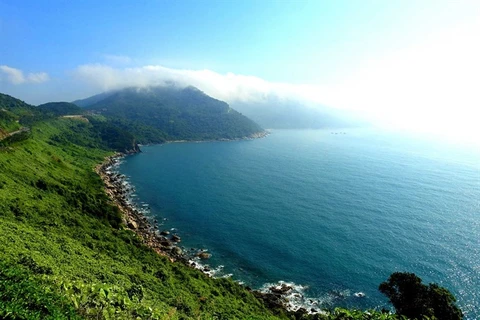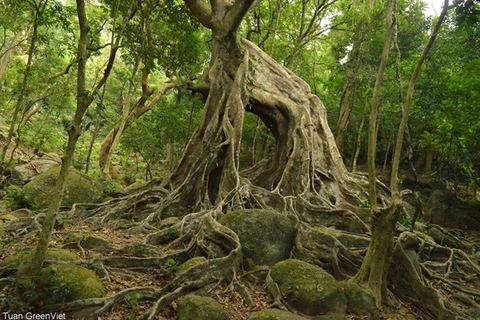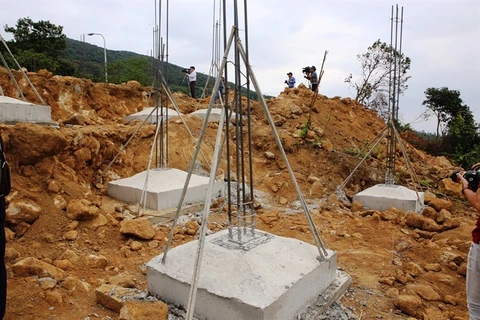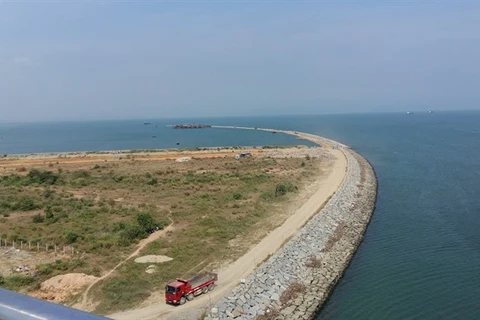Da Nang (VNA) — Recent rapid construction of more than 20 hotels and resorts in Son Tra Nature Reserve is threatening the survival of highly endangered langurs and other wildlife.
Human activities, such as illegal logging and hunting, also continue to badly affect the lives of the primates and wildlife in the reserve.
The 4,400ha Son Tra Nature Reserve, known for its rich biodiversity, is home to more than 1,300 red-shanked douc langurs and more than 1,000 plants and 370 animal species.
The langurs were declared endangered by the International Union for the Conservation of Nature (IUCN) in 2013, but this was recently redefined as critically endangered – nearly extinct.
Six of the monkeys were killed by motorcyclists in 2015-17, and two cases of illegal hunting were uncovered. Two red-shanked douc langurs were reportedly killed for eating. And about 10ha of forest were illegally logged between 2014-16.
Thousands of traps and tonnes of rubbish were also collected by local rangers and volunteers during the period.
This week, a new project was launched to help save the rare primates. Da Nang’s rural authorities announced the start of reforestation to create a safe habitat for the Red-shanked douc langur (Pygathryx nemaeus) in the reserve.
The project, being run by the city’s agriculture and rural development department and an NGO, the GreenViet, will help replant 1.5ha of native trees, including Cho (Parashorea chinensis), banyan (Ficus bengalensis) and Sao den (Hopea odorata). Total investment will be 250 million VND (11,000 USD).
The project also involves an education programme to raise awareness of the need to protect biodiversity.
Under the programme, 25,000 school students and more than 3,000 local residents will be taught the importance of biological variety on field trips to the Son Tra Nature Reserve.
Last year, a business group donated 9,700 USD to build canopy gap bridges for the endangered langurs to cross roads safely.
Re-use Everything Institute Inc of Finland agreed to fund 25,000 USD for biodiversity research in the Son Tra reserve to help protect the langurs.
The Frankfurt Zoological Society and the San Diego Zoo have also been cooperating with the city to try and save the primates. -VNA
The 4,400ha Son Tra Nature Reserve, known for its rich biodiversity, is home to more than 1,300 red-shanked douc langurs and more than 1,000 plants and 370 animal species.
The langurs were declared endangered by the International Union for the Conservation of Nature (IUCN) in 2013, but this was recently redefined as critically endangered – nearly extinct.
Six of the monkeys were killed by motorcyclists in 2015-17, and two cases of illegal hunting were uncovered. Two red-shanked douc langurs were reportedly killed for eating. And about 10ha of forest were illegally logged between 2014-16.
Thousands of traps and tonnes of rubbish were also collected by local rangers and volunteers during the period.
This week, a new project was launched to help save the rare primates. Da Nang’s rural authorities announced the start of reforestation to create a safe habitat for the Red-shanked douc langur (Pygathryx nemaeus) in the reserve.
The project, being run by the city’s agriculture and rural development department and an NGO, the GreenViet, will help replant 1.5ha of native trees, including Cho (Parashorea chinensis), banyan (Ficus bengalensis) and Sao den (Hopea odorata). Total investment will be 250 million VND (11,000 USD).
The project also involves an education programme to raise awareness of the need to protect biodiversity.
Under the programme, 25,000 school students and more than 3,000 local residents will be taught the importance of biological variety on field trips to the Son Tra Nature Reserve.
Last year, a business group donated 9,700 USD to build canopy gap bridges for the endangered langurs to cross roads safely.
Re-use Everything Institute Inc of Finland agreed to fund 25,000 USD for biodiversity research in the Son Tra reserve to help protect the langurs.
The Frankfurt Zoological Society and the San Diego Zoo have also been cooperating with the city to try and save the primates. -VNA
VNA

























